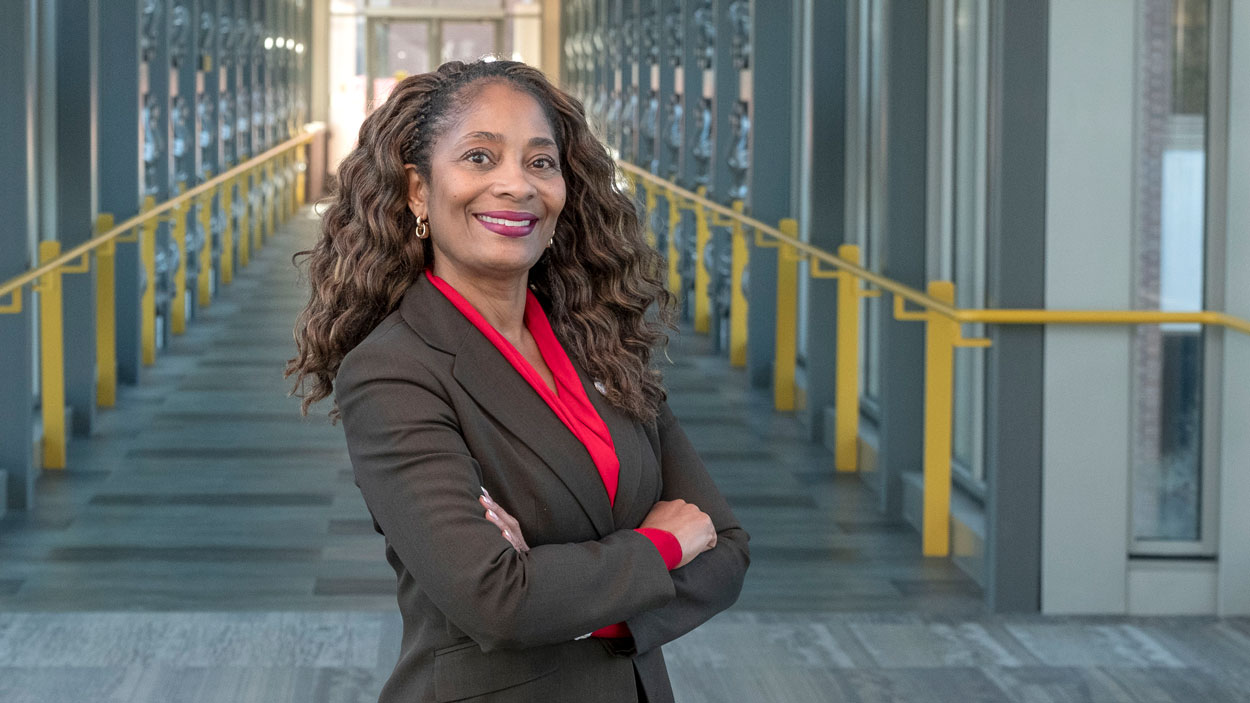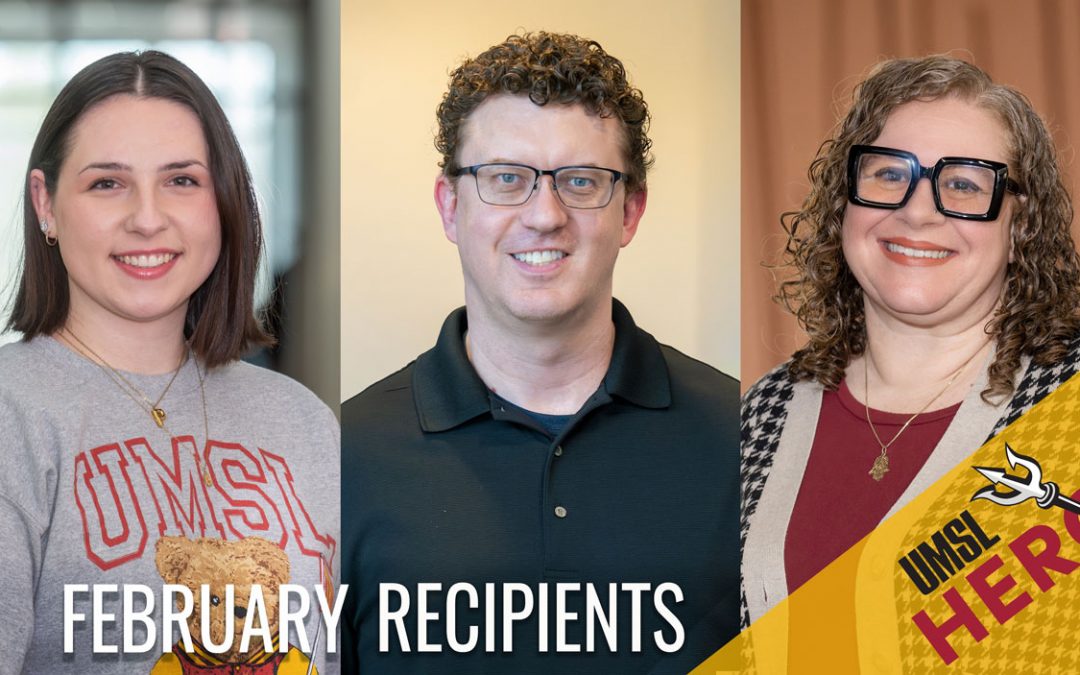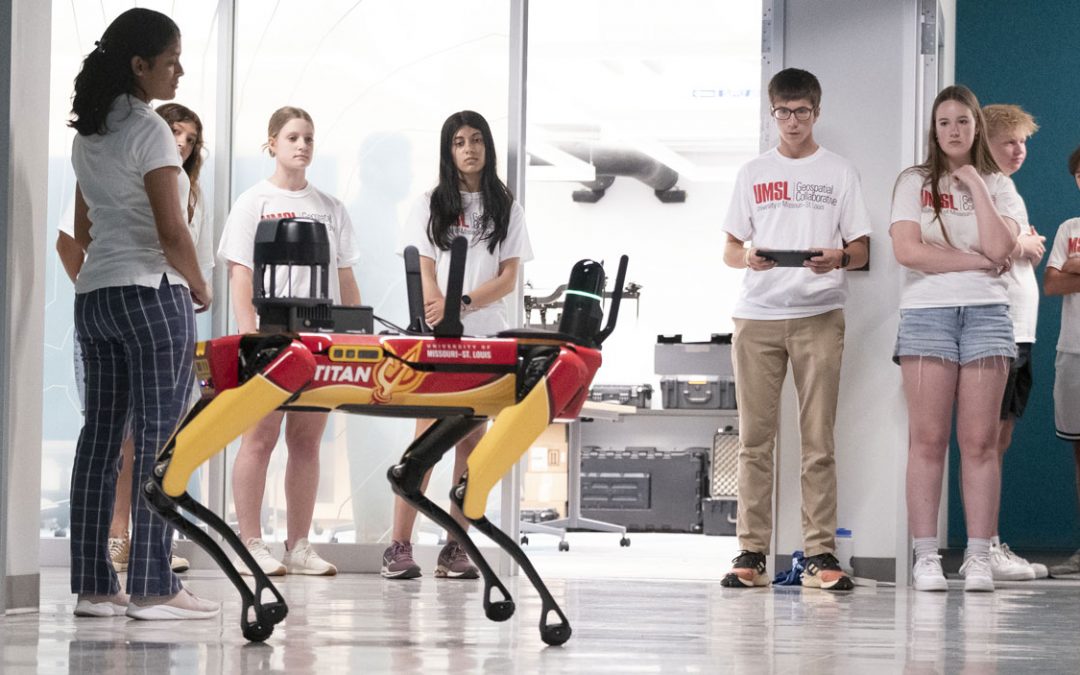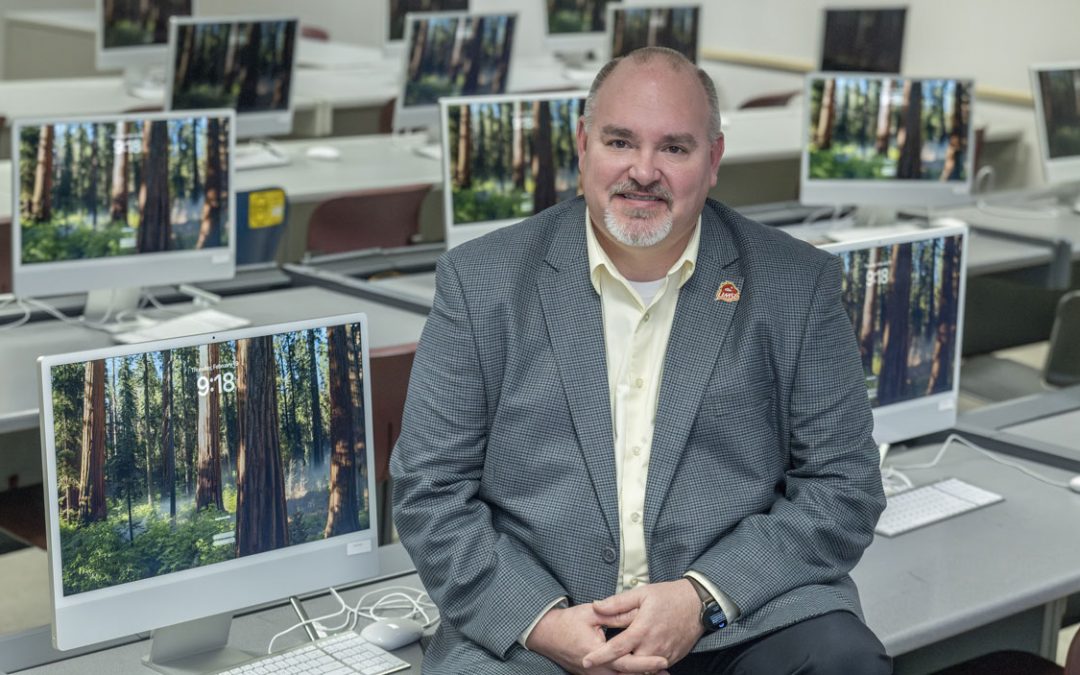
In her quest to continue her professional development, Regina McWilliams, a vice president at MasterCard, found exactly what she was looking for in a doctoral program at UMSL. (Photo by Derik Holtmann)
Regina McWilliams was already a vice president and senior business leader at MasterCard, with an impressive LinkedIn profile that showcased her leadership positions with influential companies in a variety of industries, including Nestle Purina, Monsanto, Wells Fargo, Maritz and Watlow, along with her MBA in international business from Saint Louis University.
Still, she felt something was missing from the portfolio of skills that had propelled her to even more success after a successful career. She began to research doctoral programs, but with very specific requirements as she looked for the place to continue her professional education.
“I wanted to find a practical program at the doctoral level that could help me articulate, both verbally and in writing, fact-based research that backed up various perspectives, arguments and thoughts as we were trying to advance various business initiatives here at MasterCard,” she said. “It’s one thing to go into a room and say, ‘Well, I think we should do this.’ But I wanted to be able to convey what the data shows, and to know how to structure that data in an organized format that is logical and methodical, and to know how to present that conclusion based on research.”
After researching multiple programs, McWilliams found what she was looking for with the Doctor of Business Administration program at the University of Missouri–St. Louis. Conversations with Ekin Pellegrini, the program’s founding director, solidified her decision. McWilliams joined the DBA program in the fall semester of 2020 and finished in December 2023.
And this fall, she learned that her paper exploring the impact of cultural differences that play out in the workplace titled “Cultural Microaggressions in Multinational Organizations: Organizational Inclusivity and Employee Coping Strategies,” had been accepted for publication in the International Journal of Cross Cultural Management, a peer-reviewed journal that publishes original, ground-breaking research.
“The feeling is euphoric,” McWilliams said with a smile. “It gives you that reassurance that yes, what I did in putting in all the hard work and unwavering commitment actually means something to someone other than me. The governing body of the journal, which is highly esteemed, actually said, ‘This deserves to be published.’ So, now my work can be cited, it can be read and used across the world. And others can take what I did and advance it even further.”
Having her research accepted for publication also had a deeper meaning for McWilliams. It was very much a way of honoring Bettina Casad, the original chair of her dissertation committee. Casad, an associate professor in the Department of Psychological Sciences, died in March 2023.
“I really want to pay respect and honor Dr. Casad, because Bettina started this journey with me,” McWilliams said. “My whole career, I thought in predominantly a qualitative manner, and I was convinced that I was doing a qualitative study. But Bettina convinced me that if I did the upfront work and really thought about how to frame my questions and what it is I’m trying to solve for, the quantitative approach was best. And Bettina and Ekin made it clear that I had to advance research. You can’t just do something that has already been done and go, ‘Well, here’s what I think about it, too.’ Bettina and Ekin helped show me how to find out what has not been done.”
With Casad’s guidance, McWilliams was able to stay true to the original questions about cultural microaggressions she wanted to research – What’s the impact to an organization and also the employee? What do they do with it when it comes to their contributions? Do they leave? Do they confront it? – while taking it in a direction that hadn’t been explored and also would have practical applications for her own workplace, MasterCard. Her research also has important implications for multinational organizations even beyond business.
“I still kept the core of what I wanted to study in terms of my passion, how we show up at work and either make or break a person’s experience just by our reactions, our thoughts, our words and sometimes just unspoken behaviors that really influence how a person authentically shows up or not,” she said. “I would hear things like, ‘So, this happened? So what? Why do I care? Work still is going to get done.’ But with my research, I was able to show that, yes, it does still get done but look at the impact that you are having on a person’s engagement, morale and productivity at work. Look at the impact when they start having to adopt all of these coping strategies.
“My research turned into, what is it like for someone who is not born in this country to do business with us in this country, and how are the microaggressions received? That’s what we focused on. Bettina and Ekin, in particular, helped me to frame the research from that perspective.”
After Casad passed away, McWilliams’ dissertation committee shifted. Gerald Gao, a professor of marketing at the Ed G. Smith College of Business and an associate dean of research and faculty affairs, became the committee’s chair. During that time of transition McWilliams wondered if she might have to essentially start over again, but she quickly realized that wasn’t the case.
Because of how UMSL sets up the dissertation committee for each DBA student, all members of the committee are invested in the research from the beginning. So Gao and the other members were acutely aware of how much work McWilliams and Casad had put into the project, and they were ready to step up and help McWilliams continue.
“It was almost like it was meant to be in terms of Dr. Gao picking up the baton and not letting my morale, my motivation, go into a rabbit hole or feeling like I was out there on my own,” she said. “We took what I had done with Dr. Casad so far, and he challenged me with questions like, ‘Have you thought about this?’ Or ‘What about that?’ He challenged me beyond anything I thought I was capable of doing. The level of statistical analysis that’s in my paper … With Dr. Gao’s help, I did quantitative statistical analytics that I didn’t even know was possible with data. I’m so proud of it. Dr. Gao definitely picked up the baton with where Bettina and I started and took it even to the next level.”
Gao was quick to give credit to the work done before he became chair.
“Bettina really started the foundation for this research, and everything was easier for me to pick up because of the work they did,” he said. “Regina was very self-motivated. Through the whole process she was willing to really listen and to make changes based on feedback. That’s a critical part of the process. The DBA students work with the committee, and obviously the committee will offer many types of feedback, sometimes positive, sometimes not that positive. The question is, how do they actually take the suggestions in a constructive way that incorporates the feedback and produces more meaningful outcomes? As we tell them, it’s all about helping you produce something that will be your intellectual property, so you really should put all the possible efforts into it so you produce something that you are really proud of.”
He paused.
“Regina is an example of seeing the output of all the effort and time the students put into this, and she has so much to be proud of.”
McWilliams said she has already seen the benefits of earning her DBA from UMSL, aside from adding the new title and getting published. Every day at MasterCard, she uses the lessons she learned at UMSL and applies them to how she prepares presentations and how she leads her team in conveying the information she’s learned in a structured manner that’s easily digestible and based on fact.
“Now my executive team looks at the way that I present things in a very methodical, fact-driven way, and it’s no longer just Regina’s perspective, based upon what my thoughts are,” she said. “I can actually go and conduct research and say, ‘Let’s look at the data.’ Now I know how to model that data and present it in either a qualitative form or quantitative form, to say, ‘This is what the facts show.’”
Not only did she fulfill a professional goal of earning her DBA, but she also met her personal goal, too.
“Another motivator for me in completing the doctoral program was continuing the trailblazing legacy of my family,” she said. “Many people say I’m a trailblazer in so many ways: first to go to college, first to graduate, first master’s, first sorority, first executive leader, first to establish a foundation to formally help others, and many other firsts. But there never had been a doctor in our family, so I wanted to also establish that as a legacy, personally and professionally. I remember sitting there during COVID and saying to myself, ‘If I don’t do it now, I’m never going to do it.’ And now, it’s done and not only is it done for me, but now others can take the same shoulders I stand on and soar even higher, for generations and generations untold.”














